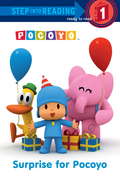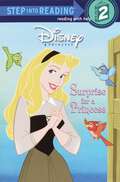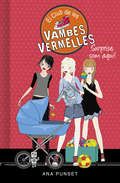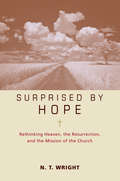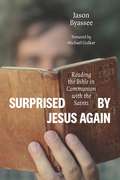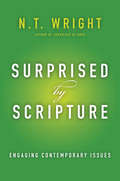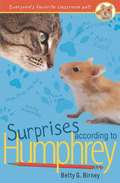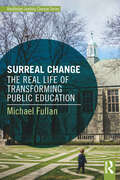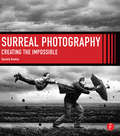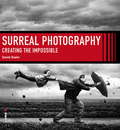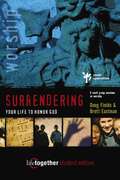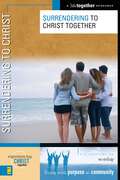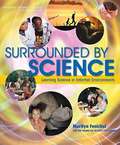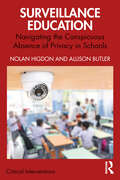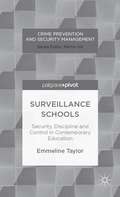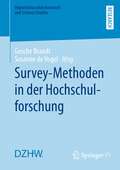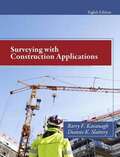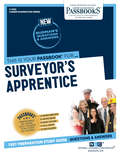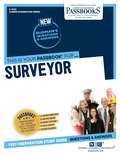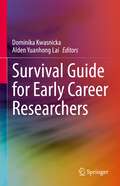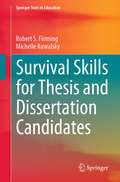- Table View
- List View
Surprise for Pocoyo (Pocoyo)
by Random House Christy WebsterPocoyo's friends are throwing him a surprise party. But will they be able to keep it a secret from curious little Pocoyo? Boys and girls ages 2-5 will love this Step 1 reader based on an episode of the popular Pocoyo TV series.
Surprise for a Princess (Step into Reading)
by Jennifer Liberts Weinberg RH DisneyIt’s Princess Aurora’s birthday, and the good fairies want to prepare a surprise for her without using any magic. Young readers will enjoy the fun and mayhem that ensues in this Step 2 reader based upon the Disney classic, Sleeping Beauty.
Surprise, som aquí! (Sèrie El Club de les Vambes Vermelles #Volumen 17)
by Ana PunsetViu una nova aventura amb les noies del Club de les Vambes Vermelles! Les noies del Club de les Vambes Vermelles estan en plena època d'exàmens i, a més, la Laia està fent de cangur de tres nens petits... Per què el dia no pot tenir més hores? Per sort, les seves amigues estan sempre a punt per ajudar-la. No hi ha dubte: juntes podem amb tot!
Surprised by Hope Participant's Guide: Rethinking Heaven, the Resurrection, and the Mission of the Church
by N. T. Wright Kevin HarneyGain an exciting new vision for your life on earth in light of your future in heaven. Wonderful as is the promise of heaven, a glorious hereafter is just part of what salvation is about. What about today? Jesus called his followers the salt of the earth and the light of the world. Your life here and now is of tremendous consequence, and what you believe about the future has a direct impact on how you live in the present. In six transforming, faith-inspiring sessions, premier biblical scholar N. T. Wright opens your eyes to the amazing full scope of what God's Word has to say about the world to come and the world that is. Designed for use with the video.
Surprised by Jesus Again: Reading the Bible in Communion with the Saints
by Jason ByasseeA bold, historical, robust approach to reading Scripture and encountering Jesus anewNo one expects to be surprised. Yet biblical interpretation can do exactly that. Christians expect to see Jesus as they read the Bible, but when and how Jesus actually speaks through Scripture can still surprise us!Drawing on the early church’s theological giants—Origen, Augustine, Gregory the Great, and more from the historical cloud of witnesses—author Jason Byassee models how we can recover ancient Christians’ multiple ways of reading the Bible to our benefit. As Byassee says, God himself is Jewish, Catholic, and Pentecostal—so much larger than our own little corner on the truth—and this book offers readers a refreshingly enhanced vision of the Bible and of Jesus himself.
Surprised by Jesus Again: Reading the Bible in Communion with the Saints
by Jason ByasseeA bold, historical, robust approach to reading Scripture and encountering Jesus anewNo one expects to be surprised. Yet biblical interpretation can do exactly that. Christians expect to see Jesus as they read the Bible, but when and how Jesus actually speaks through Scripture can still surprise us!Drawing on the early church&’s theological giants—Origen, Augustine, Gregory the Great, and more from the historical cloud of witnesses—author Jason Byassee models how we can recover ancient Christians&’ multiple ways of reading the Bible to our benefit. As Byassee says, God himself is Jewish, Catholic, and Pentecostal—so much larger than our own little corner on the truth—and this book offers readers a refreshingly enhanced vision of the Bible and of Jesus himself.
Surprised by Scripture: Engaging Contemporary Issues
by N. T. WrightBishop, Bible scholar, and bestselling author N. T. Wright here provides a series of case studies on how to apply the Bible to the pressing issues of today. Among the topics Wright addresses are the intersection of religion and science, why women should be allowed to be ordained, what we get wrong and how we can do better when Christians engage in politics, why the Christian belief in heaven means we should be at the forefront of the environmental movement, and many more.Wright fearlessly wades through the difficult issues facing us. Readers will find new models for understanding how to affirm the Bible in today's world as well as encouragement and renewed energy for deepening our faith and engaging with the culture around us. ts everyone Why the Christian belief in heaven means we should be at the forefront of the environmental movement And much moreHelpful, practical, and wise, Surprised by Scripture invites readers to examine their own hearts and minds and presents new models for understanding how to affirm the Bible in today's world--as well as new ideas and renewed energy for deepening our faith and engaging with the world around us.
Surprises According to Humphrey (According to Humphrey #4)
by Betty G. BirneyA classroom hamster has to be ready for anything, but suddenly there are LOTS-LOTS-LOTS of big surprises in Humphrey's world. <P><P> Some are exciting, like a new hamster ball. <P><P>But some are scary, like a run-in with a cat and a new janitor who might be from another planet. <P>But even with all that's going on, Humphrey finds time to help his classmates with their problems. <P>But will Mrs. Brisbane's unsqueakable surprise be too much for Humphrey to handle?
Surprising Mystics
by Herbert ThurstonThe renowned Jesuit author Herbert Thurston's final book about one of his favorite topic—mystics and their extraordinary experiences in which he reviews the lives of Margery Kempe of Lynn, Anne Catherine Emmerich, Domenica dal Paradiso, et al."Remarkable collection of studies of eccentric sanctity...of extreme interest." Times Literary Supplement"So much was [Fr. Thurston] a priest as well as a scholar, so lovingly intent on the study of the mystic as a whole person, that these 13 biographical sketches remind one of a series of brilliant tapestries, peopled by figures almost alive."-BlackfriarsHerbert Henry Charles Thurston SJ (15 November 1856 – 3 November 1939) was an English priest of the Roman Catholic Church, a member of the Jesuit order, and a prolific scholar on liturgical, literary, historical, and spiritual matters. In his day, he was regarded as an expert on spiritualism. Today he is remembered chiefly for his extensive contributions to the Catholic Encyclopedia.
Surreal Change: The Real Life of Transforming Public Education (Routledge Leading Change Series)
by Michael FullanIn Surreal Change: The Real Life of Transforming Public Education, internationally renowned expert Michael Fullan reflects on the leading trends and ideas within the educational change field over a 50-year period. The author traces the evolution of the field through his own personal developments and contributions to it, working chronologically through "The 12 Seminal Ideas" of his career. Fullan shows his personal and vulnerable side as well as how he came to develop breakthrough ideas. By looking at the way the field has transformed and grown over time, Fullan draws attention to what ideas have persisted, what problems still need solving, and what faces teachers, leaders and reformers today. Deeply personal and insightful, Surreal Change contextualizes the past, present, and future of school reform to help leaders continue to bring about lasting, positive, systemic change in their organization.
Surreal Photography: Creating The Impossible
by Daniela BowkerSurreal digital photography is not only an enjoyable extension of many enthusiast’s repertoire, but is has firmly established a foothold in the world of art. This book reveals the latest developments in the field and demystifies the techniques used by modern surreal photographers, whether they favor SOOC (straight out of the camera) or sophisticated digital manipulations. Breaking down the shooting and editing process for any reader to follow and emulate, this book provides step-by-step instructions for creating extraordinary scenes. With contributions from numerous artists—including Natalie Dybisz, Jon Jacobsen and Dariusz Klimczak— readers will be able to explore many different artistic styles from impossible landscapes to unsettling portraits.
Surreal Photography: Creating the Impossible
by Daniela BowkerEver since Man Ray imposed the sound holes of a violin onto his model's back, photographers have been enthusiastic practitioners of surreal art. Now with the advent of high-quality digital photo-manipulation the possibilities for creativity have become infinite. This book reveals the latest techniques in the field of surreal photography and features art from a host of the very best modern surreal photographers.- Breaks down the shooting and editing process so any photographer can make their own impossible images- With processing walkthroughs from contributing artists including Natalie Dybisz, Julie de Waroquier and Sarolta Bán- Step-by-step instructions for creating extraordinary scenes- Covers many different styles, from impossible landscapes to unsettling portraits
Surrendering Your Life for God's Pleasure: Six Sessions on Worship (Doing Life Together)
by Todd Wendorff Brett Eastman Dee Eastman Denise WendorffWhat does it mean to surrender to God? These six sessions will help you experience the transforming power of a surrendered life. As you learn to worship Christ throughout you daily life, you will come to trust him with the experiences of your past, the precious things of your present, and your hopes for the future. What are you holding onto? Discover the peace of laying it at God’s feet. “Doing Life Together is a groundbreaking study…[It’s] the first small group curriculum built completely on the purpose-driven paradigm…The greatest reason I’m excited about [it] is that I’ve seen the dramatic changes it produces in the lives of those who study it.” —From the foreword by Rick Warren Based on the five biblical purposes that form the bedrock of Saddleback Church, Doing Life Together will help your group discover what God created you for and how you can turn this dream into an everyday reality. Experience the transformation firsthand as you begin Connecting, Growing, Developing, Sharing, and Surrendering your life together for him.
Surrendering to Christ (Experiencing Christ Together)
by Karen Lee-Thorp Todd Wendorff Brett Eastman Dee Eastman Denise Wendorff"Trust can be a tough issue for kids. Chances are, your students want to rely on God for everything, but are still holding on to the ideal of self-sufficiency. Surrendering to Christ Together looks at the life of Jesus and shows students how giving in to God can be the best decision they will ever make. Six sessions will let students explore the heart issues of surrender that lead to deeper worship: · Afloat in a Storm: How do I trust God when everything seems to be falling apart? · The Key to Significance: How do I let go of my goals and discover what God wants me to do? · True Greatness: How do I become great in God’s eyes? · Wild Gratitude: How do I respond to Christ for everything he’s done for me? · Ultimate Trust: How do I know it's God’s will if it’s the thing that makes the least sense? · Victory Over Death: What does it mean to me that Jesus conquered death? Students who develop a lifelong faith yield to Jesus at every turn. Surrendering to Christ Together is the best way to help your kids learn that submission to God truly is the best way to live."
Surrounded by Science: Learning Science in Informal Environments
by National Research CouncilPractitioners in informal science settings--museums, after-school programs, science and technology centers, media enterprises, libraries, aquariums, zoos, and botanical gardens--are interested in finding out what learning looks like, how to measure it, and what they can do to ensure that people of all ages, from different backgrounds and cultures, have a positive learning experience. Surrounded by Science: Learning Science in Informal Environments, is designed to make that task easier. Based on the National Research Council study, Learning Science in Informal Environments: People, Places, and Pursuits, this book is a tool that provides case studies, illustrative examples, and probing questions for practitioners. In short, this book makes valuable research accessible to those working in informal science: educators, museum professionals, university faculty, youth leaders, media specialists, publishers, broadcast journalists, and many others.
Surrounded by Science: Learning Science in Informal Environments
by National Research Council of the National AcademiesPractitioners in informal science settings--museums, after-school programs, science and technology centers, media enterprises, libraries, aquariums, zoos, and botanical gardens--are interested in finding out what learning looks like, how to measure it, and what they can do to ensure that people of all ages, from different backgrounds and cultures, have a positive learning experience. Surrounded by Science: Learning Science in Informal Environments, is designed to make that task easier. Based on the National Research Council study, Learning Science in Informal Environments: People, Places, and Pursuits, this book is a tool that provides case studies, illustrative examples, and probing questions for practitioners. In short, this book makes valuable research accessible to those working in informal science: educators, museum professionals, university faculty, youth leaders, media specialists, publishers, broadcast journalists, and many others.
Surveillance Education: Navigating the Conspicuous Absence of Privacy in Schools (Critical Interventions)
by Nolan Higdon Allison ButlerSurveillance Education explores the pervasive use of digital surveillance technologies in schools and assesses its pernicious effects on students. Recognizing that the use of digital technologies will persist, the authors instead offer practical ways to ameliorate their impact.In our era of surveillance capitalism, digital media technologies are ever more intertwined into the educational process. Schools are presented with digital technologies as tools of convenience for gathering and grading student work, as tools of support to foster a more equitable learning environment, and as tools of safety for predicting or preventing violence or monitoring mental, emotional, and physical health. Despite a dearth of evidence to confirm their effectiveness, digital data collection and tracking is often presented as a way to improve educational outcomes and safety. This book challenges these fallacious assumptions and argues that the use of digital media technologies has caused great harm to students by subjecting them to oppressive levels of surveillance, impinging upon their right to privacy, and harvesting their personal data on behalf of Big-Tech. In doing so, the authors draw upon interviews from K–12 and higher education students, teachers, and staff, civil rights and technology lawyers, and educational technological programmers. The authors also provide practical guidance for teachers, administrators, students, and their families seeking to identify and combat surveillance in education.This urgent, eye-opening book will be of interest to students and educators with interests in critical media literacy and pedagogy and the sociology of technology and education.
Surveillance Schools: Security, Discipline and Control in Contemporary Education
by Emmeline TaylorFocusing on the phenomena of the Surveillance School, Taylor examines the increased presence of surveillance technologies and practices which identify, verify, categorise and track pupils, exploring the impact that invasive and continual monitoring is having upon school children.
Survey-Methoden in der Hochschulforschung (Higher Education Research and Science Studies)
by Gesche Brandt Susanne De VogelViele (Erhebungs-)Projekte in der Hochschulforschung bringen neue Erkenntnisse aus dem Bereich der Survey Methodology hervor. Damit Forschende von dieser Expertise profitieren und sie für die Optimierung ihrer Befragungspraxis nutzen können, werden die Ergebnisse in diesem Sammelband zusammengebracht. Vorgestellt werden Beiträge zum Thema Rekrutierung und Incentivierung, Survey Design und Mixed Devices, Instrumentenentwicklung, Panel Attrition und Non-Response sowie internationale Befragungen. Der Fokus liegt dabei auf den besonderen Herausforderungen, die die Erforschung Hochqualifizierter für die Durchführung quantitativer Studien mit sich bringt.
Surveying with Construction Applications
by Barry F. Kavanagh Dianne K. SlatteryTeaching and Learning Experience This book will help surveyors master all the modern skills, techniques, and technologies they need to work effectively with construction professionals and engineers: Thoroughly presents all the general surveying principles and techniques students need: Begins with eleven chapters walking through surveying fundamentals, distance measurement, computations, satellite positioning, geomatics, and much more -- including a brand-new math review chapter for students with limited math background Links principles and techniques to contemporary applications in the construction of most civil projects: Addresses a wide range of surveying applications, from highways and streets to pipelines, tunnels, bridges, culverts, and buildings Provides extensive hands-on practice, strong pedagogy, and valuable professional reference resources: Includes updated laboratory exercises, efficient features for review, useful reference appendices, up-to-date web links, and more
Surveyor's Apprentice: Passbooks Study Guide (Career Examination Series)
by National Learning CorporationThe Surveyor's Apprentice Passbook® prepares you for your test by allowing you to take practice exams in the subjects you need to study. It provides hundreds of questions and answers in the areas that will likely be covered on your upcoming exam.
Surveyor: Passbooks Study Guide (Career Examination Series #C-3030)
by National Learning CorporationThe Surveyor Passbook® prepares you for your test by allowing you to take practice exams in the subjects you need to study. It provides hundreds of questions and answers in the areas that will likely be covered on your upcoming exam.
Survival Guide for Early Career Researchers
by Dominika Kwasnicka Alden Yuanhong LaiNavigating research careers is often highly challenging for early career researchers (ECRs) in the social sciences. The ability to thrive in research careers is complex and requires "soft" people and management skills and resilience that often cannot be formally taught through university coursework. Written from a peer perspective, this book provides guidance and establishes emotional rapport on topical issues relevant for ECRs in academia and industry. The authors are ECRs who have been successful in navigating their careers, and they seek to connect with readers in a supportive and collegial manner. Each chapter includes elements of story-telling and scientific thinking and is organized into three parts: (1) a personal story that is relevant to the topic; (2) key content on professional and personal effectiveness based on evidence in the psychological, sociological, and/or management sciences; and (3) action points and practical recommendations. The topics covered are specifically curated for people considering undertaking research careers or already working in research, including:Work Hard, Snore Hard: Recovery from Work for Early Career ResearchersNetworking and Collaborating in Academia: Increasing Your Scientific Impact and Having Fun in the ProcessAccelerating Your Research Career with Open ScienceEngaging with the Press and MediaMake Your Science Go Viral: How to Maximize the Impact of Your ResearchExploring the Horizon: Navigating Research Careers Outside of AcademiaThinking like an Implementation Scientist and Applying Your Research in PracticeSurvival Guide for Early Career Researchers summarizes relevant evidence-based research to offer advice in strategic but also supportive ways to ECRs. It is an essential go-to practical resource for PhD students, postdoctoral fellows, and junior faculty. This book will also benefit senior researchers who are serving as mentors or delivering professional development programs, administrators and educators in institutions of higher learning, and anyone with an interest in building a successful research career.
Survival Schools: The American Indian Movement and Community Education in the Twin Cities
by Julie L. DavisIn the late 1960s, Indian families in Minneapolis and St. Paul were under siege. Clyde Bellecourt remembers, &“We were losing our children during this time; juvenile courts were sweeping our children up, and they were fostering them out, and sometimes whole families were being broken up.&” In 1972, motivated by prejudice in the child welfare system and hostility in the public schools, American Indian Movement (AIM) organizers and local Native parents came together to start their own community school. For Pat Bellanger, it was about cultural survival. Though established in a moment of crisis, the school fulfilled a goal that she had worked toward for years: to create an educational system that would enable Native children &“never to forget who they were.&”While AIM is best known for its national protests and political demands, the survival schools foreground the movement&’s local and regional engagement with issues of language, culture, spirituality, and identity. In telling of the evolution and impact of the Heart of the Earth school in Minneapolis and the Red School House in St. Paul, Julie L. Davis explains how the survival schools emerged out of AIM&’s local activism in education, child welfare, and juvenile justice and its efforts to achieve self-determination over urban Indian institutions. The schools provided informal, supportive, culturally relevant learning environments for students who had struggled in the public schools. Survival school classes, for example, were often conducted with students and instructors seated together in a circle, which signified the concept of mutual human respect. Davis reveals how the survival schools contributed to the global movement for Indigenous decolonization as they helped Indian youth and their families to reclaim their cultural identities and build a distinctive Native community.The story of these schools, unfolding here through the voices of activists, teachers, parents, and students, is also an in-depth history of AIM&’s founding and early community organizing in the Twin Cities—and evidence of its long-term effect on Indian people&’s lives.
Survival Skills for Thesis and Dissertation Candidates (Springer Texts in Education)
by Robert S. Fleming Michelle KowalskyThis is a must-have preparation and reference guide for students embarking on the challenging journey of completing a thesis or dissertation. The authors, who are both “students of thesis and dissertation travel,” combine their expertise and insights to offer wise travel guidance designed to enhance both the success and satisfaction of this likely once-in-a-lifetime journey. The various chapters provide a realistic preview of how to prepare for and how to complete each stage of this travel journey successfully. Individual chapters on each of the major tasks each serve as an important reference for students to review as they progress, thus providing a guide which will be consulted many times throughout their program. The book provides advice on the most common aspects of the thesis or dissertation process, and it is written in a user-friendly manner designed to engage students and to enhance their comfort level as they journey through their candidacy. The importance of each task in the thesis or dissertation journey is addressed, along with its role in contributing to a successful outcome, and is accompanied by advice and suggestions from previous travellers. The challenges inherent in all stages of the journey are examined, along with proactive strategies for avoiding potential “bumps in the road.” You will not want to depart on this monumental travel adventure without this valuable survival guide!
